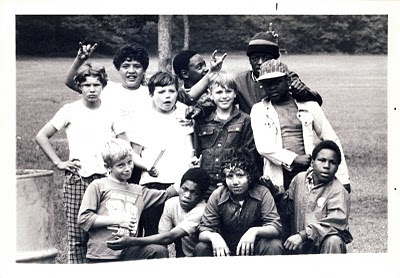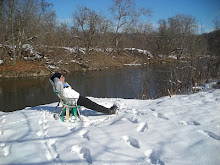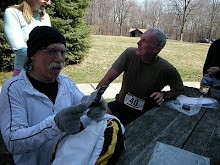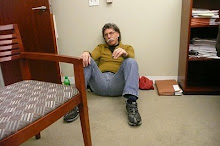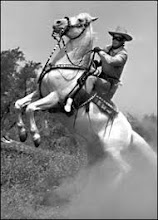Robb Hill Photo, Robb Hill
(Photo used in the NPR.Org/3 Minute Fiction Contest, which this author entered.)
He sat at the small table by the window leafing through the local paper. He had just come from the gym where he goes to be around people without having to interact. In pre-school they call it parallel play. He walks on the treadmill watching the television. The treadmill is good for those wanting solitude, while being around others. It lasts an hour to do his 4 miles. His doctor said to get some weight off otherwise he would be at-risk.
He laughed to himself when his doctor said that. He has always been “at-risk”. Joni Mitchell once wrote that she lived in a box of paints. He does, too. Not only in a box of paints, but in his apartment, in his work, at the gym, and in his mind.
When he wants to prolong his walk from the gym to his apartment, he stops at this coffee shop and sits by the window. He buys a latte, with skim and no whip, smiles at the clerk, engages in some ‘hello’ small talk, and drops 30 cents in the tip jar. He picks a secluded seat by the large plate-glass watching from the inside out.
He feels safe and secure in this neighborhood. It is home.
The street is darkening now. The lampposts are coming on. Some storefronts have lit signs reflecting and soaking up the dimming darkness of dusk.
Winter’s night comes earlier than he would like, but today the air reached 50 degrees, so he wore his spring jacket with his baseball cap. Spring is like a sweet kiss. You can dream about it, yet when it comes, your body savors every ounce of its affection.
He stares out the glass into a scene framed by his visual cortex, and draws it into his unconscious. From that sensation he takes a deep, and sighing breath and thinks about his loneliness. This part-time haunting awareness creeps in and around his routines without warning. He accepts it. Understands it. Does not fear it. Inspiration mined. And paintings evolve through translation. He is reminded of an aloof cat that keeps its distance, comes close, sits, purrs yet still brings comfort with its presence. His loneliness has a beating heart, as does the cat. You wish for the pet to curl up on your lap so the two of you can have an intimate moment, a shared moment of contact, but it rarely happens. But when it does, you realize just why you love her.
Loneliness can offer an understanding of the meaning of intimacy. Without the one, you cannot have the other. They fill each leg of the pants.
He drinks his latte while leafing through the paper then stops on the page where the obituaries and notices are printed. He has always been a reader of these personally public pages. He finds solace in the search for anyone whose family has offered a death or divorce notice, or for that matter, a missing person’s posting.
He stops and reads one for a second time. His heart beats faster, and senses a rush of reverberating anxiety. It is of an elderly woman he once knew. She was younger then when he last saw her 20 years ago, during the time he romanced her daughter for several months from spring throughout that winter.
He stops. Sits quietly for a while remembering missed days from his past, brought instantaneously up from memories stored quietly away.
He slowly, and with deliberate purpose rises from the wooden chair, discards the emptied cup, and walks home in thought remembering a missed chance at love. (600 words.)
*******************
*******************
Funny How Fate Works
by Elliott D.
“Teacher may have saved lives.” That’s what the headline read. Left the paper spread eagled on a little red table in the Laundromat just like I found it. This nutcase didn’t get tenure, so she fired on her coworkers and Lisa would have been one of her victims. Lisa Schicksal. Couldn’t believe it when I saw her picture. Not that I really recognized her after all these years. Luckily, the gun misfired. My Lisa is a teacher and some kind of hero.
How long has it been? I wondered as I heaved my Dad’s old World War II army duffel bag containing laundry over my left shoulder. How many times did I relive that night we spent together? She was my college sweetheart, although I never told her that. Don’t get me wrong, I wanted to but …. Somehow, I never could do it. I guess I placed her on a pedestal so high that I didn’t know how to reach her.
Seems like these sorts of things bunch together. I mean, what’s with people nowadays? Do they ever think about the consequences of their actions? A guy flies a piper cub into an office building ‘cause he’s mad at the IRS. Someone starts shooting in a Denver area school parking lot ‘cause who knows why. The paper said Lisa heard the gun click as this professor tried to fire it at her. Then, Lisa shoved her out of the room, and they barricaded the door with a wooden desk.
Funny how fate works. I never frequented a Laundromat before, at least not since college days. Two weeks ago, my divorce with Karen became official. I’m lucky I have a bed to sleep on in the new place, let alone a washer and dryer. There are a few other priorities, like dishes and silverware. My 21 year-old daughter doesn’t seem to mind going out to eat, though.
The wind picked up as I stepped outside. I donned my Rock ‘n’ Roll Hall of Fame & Museum cap. At least it won’t be snowing for another couple of months, I sighed, shifting the weight of the army green bag.
What if I called her? I mean, I’m divorced now. Maybe there’s a reason that paper was open to that page. Maybe there’s a reason she appeared out of nowhere. Shards of memories sliced through my thoughts and lay scattered across the floorboards of my mind, sparkling like little jewels. Listening to Lisa’s favorite Bob Dylan records after class, lying on the brown corduroy couch. Bobbing up and down with the gentle waves in a canoe on Lake Mendota behind the Memorial Union at the University of Wisconsin, the sun splashing across Lisa’s upturned face.
Now, what could I say? Oh, yeah, I know, it’s been a while. Okay, maybe more than a while. “I uh … you know what I really wanted to tell you, Lisa, I wanted to find out how you were doin’ after all this time … I was thinkin’ ….” Well, she might laugh or hang up.
All right, maybe I’ll tell her how I’m trying to sort things out, make the puzzle pieces of my life fit. Except I’ve got pieces from more than one puzzle mixed together. “Lisa, I was thinking about us … even when I was with Karen.” No, I shook my head, that doesn’t sound right, sounds like a stalker. “Well, Lisa, did you ever wonder what it might’ve been like? I mean, if you and I had … y’know?” (600 word limit.)

